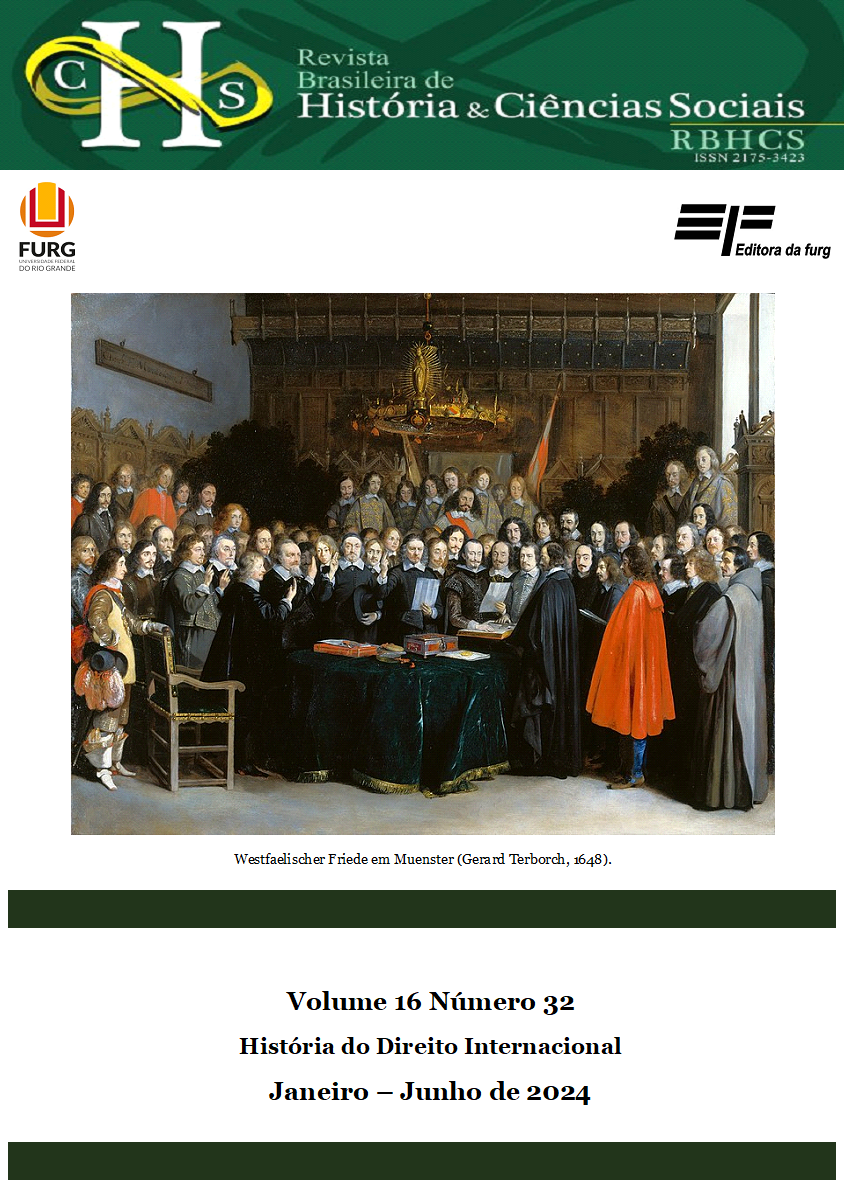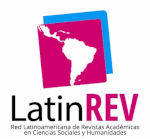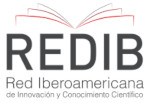A Resiliência da Identidade: Indigenato e a Virada Histórica no Direito Internacional
DOI:
https://doi.org/10.14295/rbhcs.v16i32.16369Keywords:
virada histórica no direito internacional, agência indígena, apagamento, vitimização, metodologiasAbstract
In this article, I discuss the lack of Indigenous-centric accounts in the turn to history in international law. Considering that one of the main political uses of this turn to history aims at exposing, critiquing, and ultimately undoing the harm of colonial encounters (in Third World Approaches to International Law, for instance), it is somewhat sobering that often, and particularly in Indigenous contexts, this encounter is still told from the perspective of the colonizer. In doing so, it frames Indigenous existence solely from the perspective of victimhood, which is inevitably articulated in a way that denies the agency of Indigenous people and peoples as historical actors. This paradox showcases the resilience of Eurocentrism in our articulation of international legal projects, and the resilience of Indigenous identity and resistance despite ongoing structural erasure. This chapter therefore asks what it might mean epistemologically and methodologically to centre Indigeneity in the turn to history in international law, arguing for the recovery and leveraging of Indigenous agency in the turn to history in international law. I am myself non-Indigenous, so I do not aim to offer an “Indigenous view of international legal history”, but rather simply to drive and exploit wedges in scholarship on the turn to history. These wedges might make the field more amenable to attend to the resilience of the subaltern, open the field up to other historical methodologies, and fundamentally query whether we can learn about resilience in the face of external challenges to international legal ordering from the resilience that already exists within international law.
Downloads
References
ANAYA, S. James; WILLIAMS, Robert A. Jr. The Protection of Indigenous Peoples’ Rights over Lands Natural Resources under the Inter-American Human Rights System. Harvard Human Rights Journal, Cambridge, vol. 14, [S.I.], p. 33-86, 2001.
ANGHIE, Antony. Imperialism, Sovereignty and the Making of International Law. Cambridge: Cambridge University Press, 2005. DOI: https://doi.org/10.1017/CBO9780511614262
BAY, Carmen Alemany. La Narrativa Sobre El Indígena En América Latina. Fases, Entrecruzamientos, Derivaciones. Acta Literaria, Concepción, vol. 47, n. 2, p.85-99, 2013. DOI: https://doi.org/10.4067/S0717-68482013000200006
BEHZADI, Emily. His Ship Has Sailed: Expelling Columbus from Cultural Heritage Law. Vanderbilt Journal of Transnational Law, Nashville, vol. 56, n. 1, p. 315-366, Mar. 2023.
BHATIA, Amar. International Law Can Be Something Different: An Interview with Beverly Jacobs, Jeffery Hewitt, and Sylvia McAdam. TWAILR: Dialogues, [S.I.], 22 mar. 2023. Disponível em: https://twailr.com/international-law-can-be-something-different-an-interview-with-beverly-jacobs-jeffery-hewitt-and-sylvia-mcadam/. Acesso em: 22 mai. 2023.
BLACKHAWK, Ned. The Rediscovery of America: Native Peoples and the Unmaking of US History. New Haven: Yale University Press, 2023. DOI: https://doi.org/10.12987/9780300271249
CABRERA, Martín Correa. La Historia del Despojo: El Origen de la Propiedad Particular en el Territorio Mapuche. Santiago: Pehuén, 2021.
CARLSON, Bronwyn; FARRELLY, Terri. Monumental changes: history isn’t always written by the victors. From the European South, Padova, v. 10, p. 11-24, abr. 2022.
CAROZZA, Paolo. From Conquest to Constitutions: Retrieving a Latin American Tradition of the Idea of Human Rights. Human Rights Quarterly, Baltimore, vol. 25, [S.I.], p. 281-313, 2003. DOI: https://doi.org/10.1353/hrq.2003.0023
CARTA da Organização dos Estados Americanos = CHARTER of the Organisation of American States. 30 abr. 1948. Disponível em: https://cidh.oas.org/Basicos/Portugues/q.Carta.OEA.htm.
CASTELLINO, Joshua; DOYLE, Cathal. Who Are ‘Indigenous Peoples’?: An Examination of Concepts Concerning Group Membership in the UNDRIP. In: HOHMANN, Jessie; WELLER, Marc (org.). The UN Declaration on the Rights of Indigenous Peoples: A Commentary. Oxford: Oxford University Press, 2018.
COLÔMBIA. Ministério de Relações Exteriores. Proyecto de Convención sobre la Carta Educativa Americana para la Paz, presentado al Consejo Directivo de la Unión Panamericana por el Embajador de Honduras en la sesión del 5 de noviembre de 1947, Novena Conferencia Internacional Americana, 30 Marzo 1948, Actas y Documentos, vol. V. Bogotá, 30 mar. 1948.
COLÔMBIA. Ministério de Relações Exteriores. Acta Final de la Conferencia de Bogotá – XXIX – Carta Internacional Americana de Garantías Sociales, 30 Marzo 1948, Novena Conferencia Internacional Americana, Actas y Documentos, vol. VI. Bogotá, 30 mar. 1948.
COLÔMBIA. Ministério de Relações Exteriores. Acta de la Octava Sesión de la Comisión Quinta (Versión Taquigráfica), Novena Conferencia Internacional Americana, 30 Marzo 1948, Actas y Documentos, vol. V. Bogotá, 30 mar. 1948.
CONVÊNIO Econômico de Bogotá = ECONOMIC Agreement of Bogota. 02 mai. 1948. Disponível em: http://www.oas.org/juridico/english/Sigs/a-43.html.
CORTE INTERAMERICANA DE DIREITOS HUMANOS. Relatório Anual de 1986. San José, 29 ago. 1986.
CRAVEN, Matthew. Introduction: International Law and Its Histories. In: CRAVEN, Matthew; FITZMAURICE, Malgosia; VOGIATZI, Maria (org.). Time, History and International Law. Leiden: Brill, 2007. p. 1-25. DOI: https://doi.org/10.1163/ej.9789004154810.i-255.5
CURTHOYS, Ann; GENOVESE, Ann; REILLY, Alexander. Rights and Redemption: History, Law and Indigenous People. Sydney: UNSW Press, 2008.
DECLARAÇÃO Americana sobre os Direitos dos Povos Indígenas = AMERICAN Declaration on the Rights of Indigenous Peoples (ADRIP). 15 jun. 2016. Disponível em: https://www.oas.org/en/sare/documents/DecAmIND.pdf.
DECLARAÇÃO das Nações Unidas sobre os Direitos dos Povos Indígenas = UNITED Nations Declaration on the Rights of Indigenous Peoples (UNDRIP). 13 set. 2007. Disponível em: https://www.un.org/development/desa/indigenouspeoples/wp-content/uploads/sites/19/2018/11/UNDRIP_E_web.pdf.
DHILLON, Jaskiran (org.). Indigenous Resurgence: Decolonialization and Movements for Environmental Justice. New York: Berghahn, 2022. DOI: https://doi.org/10.3167/9781800732452
DORSETT, Shaunnagh. Traditions: Tracing Legal History, Aboriginal/Indigenous Law (Australia/New Zealand). In: DUBBER, Markus D.; TOMLINS, Christopher (org.). The Oxford Handbook of Legal History. Oxford: Oxford University Press, 2018. p. 799-816. DOI: https://doi.org/10.1093/oxfordhb/9780198794356.013.41
ELLINGSON, Ter. The Myth of the Noble Savage. Berkeley: University of California Press, 2001. DOI: https://doi.org/10.1525/9780520925922
ENGLE, Karen. The Elusive Promise of Indigenous Development: Rights, Culture, Strategy. Durham: Duke University Press, 2010. DOI: https://doi.org/10.1515/9780822392965
ENGLE, Karen; LIXINSKI, Lucas. Quilombo Land Rights, Brazilian Constitutionalism, and Racial Capitalism. Vanderbilt Journal of Transnational Law, Nashville, vol. 54, n. 3, p. 831-870, Out. 2021.
ESLAVA, Luis; PAHUJA, Sundhya. Between Resistance and Reform: TWAIL and the Universality of International Law. Trade, Law and Development, Jodhpur, vol. 3, n. 1, p. 103-130, Jul. 2011.
ESTES, Nick. Our History Is the Future: Standing Rock Versus the Dakota Access Pipeline, and the Long Tradition of Indigenous Resistance. New York: Verso, 2019.
FAKHRI, Michael. Markets, Sovereignty, and Racialization. Journal of International Economic Law, Oxford, vol. 25, n. 2, p. 242-258, Jul. 2022. DOI: https://doi.org/10.1093/jiel/jgac021
FOX-DECENT, Evan; DAHLMAN, Ian. Sovereignty as trusteeship and indigenous peoples. Theoretical Inquiries in Law, Tel Aviv, vol. 16, n. 2, p. 507-533, 2015. DOI: https://doi.org/10.1515/til-2015-110
GARCIA, Beatriz; LIXINSKI, Lucas. Beyond Culture: Reimagining the Adjudication of Indigenous Peoples’ Rights in International Law. Intercultural Human Rights Law Review, Miami Gardens, vol. 15, n. 3, p. 127-169, Out. 2020.
GATTEY, Emma. Beyond Caricature and Hubris: International Law and the Emancipatory Potential of Revisionist History in a Colonised Present. Global Intellectual History, Abingdon-on-Thames, vol. 8, 2023, edição especial.
GUHA, Ranajit. The Prose of Counter-Insurgency. In: GUHA, Ranajit (org.). Subaltern Studies: Writings on South Asian History and Society, vol. 2. Oxford: Oxford University Press, 1983. DOI: https://doi.org/10.1177/001946468302000209
HALE, Charles R. Mestizaje, Hybridity, and the Cultural Politics of Difference in Post‐Revolutionary Central America. Journal of Latin American Anthropology, Hoboken, vol. 2, n. 1, p. 34-61, Set. 1996. DOI: https://doi.org/10.1525/jlca.1996.2.1.34
HAMILTON, Robert. Indigenous Legal Traditions and Histories of International and Transnational Law in the Pre-Confederation Maritime Provinces. Canada in International Law at 150 and Beyond, Waterloo, vol. 4, p. 1-12, jan. 2018.
HUNTER, Ian. Global Justice and Regional Metaphysics: On the Critical History of the Law of Nature and Nations. In: DORSETT, Shaunnagh; HUNTER, Ian (org.). Law and Politics in British Colonial Thought: Transpositions of Empire. London: Palgrave Macmillan, 2010. DOI: https://doi.org/10.1057/9780230114388_2
KENNEDY, David; KOSKENNIEMI, Martti. Of Law and the World: Critical Conversations on Power, History, and Political Economy. Cambridge: Harvard University Press, 2023. DOI: https://doi.org/10.4159/9780674294899
KOSKENNIEMI, Martti. To the Uttermost Parts of the Earth: Legal Imagination and International Power, 1300-1870. Cambridge: Cambridge University Press, 2021. DOI: https://doi.org/10.1017/9781139019774
LIXINSKI, Lucas. Selecting Heritage: The Interplay of Art, Politics, and Identity. European Journal of International Law, Oxford, vol. 22, n. 1, p. 81-100, Fev. 2011. DOI: https://doi.org/10.1093/ejil/chr001
LIXINSKI, Lucas; PELEG, Noam. Paternalism in International Human Rights Law. Duke Journal of Comparative & International Law, Durham, vol. 33, n. 1, p. 1-43, 2022.
LIXINSKI, Lucas. ‘Action to solve the Indigenous problem’: The Bogotá Conference and Indigenous Affairs between Historical Artefact and the Political Economy of the Peasantry. Journal of the History of International Law, Leiden, [S.I.], 2023. No prelo.
LORCA, Arnulf Becker. Mestizo International Law: A Global Intellectual History 1842–1933. Cambridge: Cambridge University Press, 2015.
MALLON, Florencia E. The Promise and Dilemma of Subaltern Studies: Perspectives from Latin American History. The American Historical Review, Oxford, vol. 99, n. 5, p. 1491-1515, 1994. DOI: https://doi.org/10.2307/2168386
MAR, Tracey Banivanua. Decolonisation and the Pacific: Indigenous Globalisation and the Ends of Empire. Cambridge: Cambridge University Press, 2016. DOI: https://doi.org/10.1017/CBO9781139794688
MCMILLAN, Mark; RIGNEY, Sophie. The Place of the First Peoples in the International Sphere: A Logical Starting Point for the Demand for Justice by Indigenous Peoples. Melbourne University Law Review, Melbourne, v. 39, n. 3, p. 981-1002. 2016.
MCNEIL, Kent. Indigenous Rights Litigation, Legal History, and the Role of Experts. Saskatchewan Law Review, Saskatoon, vol. 77, [S.I.], p. 173-203, 2014.
MERINO, Roger. Reimagining the Nation-State: Indigenous Peoples and the Making of Plurinationalism in Latin America. Leiden Journal of International Law, Leiden, vol. 31, n. 4, p. 773-792, Dez. 2018. DOI: https://doi.org/10.1017/S0922156518000389
MODIRZADEH, Naz Khatoon. ‘[L]et Us All Agree to Die a Little’: TWAIL’s Unfulfilled Promise. Harvard International Law Journal, Cambridge, vol. 65, n. 1, p. 1-67, 2023. DOI: https://doi.org/10.2139/ssrn.4406477
NIJMAN, Janne E. Minorities and Majorities. In: FASSBENDER, Bardo; PETERS, Anne (org.). The Oxford Handbook of the History of International Law. Oxford: Oxford University Press, 2012.
OBREGÓN, Liliana. Between Civilisation and Barbarism: Creole Interventions in International Law. Third World Quarterly, Abingdon-on-Thames, vol. 27, n. 5, p. 815-832, 2006. DOI: https://doi.org/10.1080/01436590600780136
OLSTEIN, Diego. Pensar la Historia Globalmente. Ciudad de México: Fondo de Cultura Económica, 2019.
ORFORD, Anne. International Law and the Politics of History. Cambridge: Cambridge University Press, 2021.
PENNOCK, Caroline Dodds. On Savage Shores: How Indigenous Americans Discovered Europe. London: Weidenfeld and Nicolson, 2022.
PRAKASH, Gyan. Subaltern Studies as Postcolonial Criticism. The American Historical Review, Oxford, vol. 99, n. 5, p. 1475-1490, 1994. DOI: https://doi.org/10.2307/2168385
PUIG, Sergio. At the Margins of Globalization: Indigenous Peoples and International Economic Law. Cambridge: Cambridge University Press, 2021. DOI: https://doi.org/10.1017/9781108596503
RIGNEY, Sophie. On Hearing Well and Being Well Heard: Indigenous International Law at the League of Nations. TWAIL Review, [S.I.], vol. 2, n. 2, p. 122-153, 2021.
ROBINSON, Cedric. Black Marxism: The Making of the Black Radical Tradition. Chapel Hill: University of North Carolina Press, 2000.
SACCO, Nick. Bad Historical Thinking: “History is Written By the Victors”. Exploring the Past: Reading, Thinking, and Blogging about History, Saint Louis, 15 fev. 2016. Disponível em: https://pastexplore.wordpress.com/2016/02/15/bad-historical-thinking-history-is-written-by-the-victors/. Acesso em: 22 mai. 2023.
SIMPSON, Leanne Betasamosake. A Short History of the Blockade: Giant Beavers, Diplomacy, and Regeneration in Nishnaabewin. Edmonton: University of Alberta Press, 2021. DOI: https://doi.org/10.1515/9781772125528
SYLVAIN, Renée. Essentialism and the indigenous politics of recognition in Southern Africa. American Anthropologist, Hoboken, vol. 116, n. 2, p. 251-264, abr. 2014. DOI: https://doi.org/10.1111/aman.12087
TEAIWA, Katerina Martina. Consuming Ocean Island: Stories of People and Phosphate from Banaba. Bloomington: Indiana University Press, 2015.
TZOUVALA, Ntina. Capitalism as Civilisation: A History of International Law. Cambridge: Cambridge University Press, 2020. DOI: https://doi.org/10.1017/9781108684415
VADI, Valentina. International Law and Its Histories: Methodological Risks and Opportunities. Harvard Journal of International Law, Cambridge, v. 58, n. 2, p. 311-352, abr. 2017.
VADI, Valentina, Perspective and Scale in the Architecture of International Legal History. European Journal of International Law, vol. 30, n. 1, p. 53-71, fev. 2019. DOI: https://doi.org/10.1093/ejil/chz001
VENZKE, Ingo; HELLER, Kevin Jon (org.). Contingency in International Law: On the Possibility of Different Legal Histories. Oxford: Oxford University Press, 2021. DOI: https://doi.org/10.1093/oso/9780192898036.001.0001
WATSON, Irene. Aboriginal Peoples, Colonialism and International Law: Raw Law. Abingdon-on-Thames: Routledge, 2015. DOI: https://doi.org/10.4324/9781315858999
WELLER, Marc. Self-Determination of Indigenous Peoples: Articles 3, 4, 5, 18, 23, and 46(1). In: HOHMANN, Jessie; WELLER, Marc. (org.). The UN Declaration on the Rights of Indigenous Peoples: A Commentary. Oxford: Oxford University Press, 2018.
WILLIAMS, Robert A. Jr. Taking Rights Aggressively: The Perils and Promise of Critical Legal Theory for Peoples of Color. Minnesota Journal of Law & Inequality, Minneapolis, vol. 5, n. 1, p. 103-134, Mar. 1987.
YOUNG, Stephen. Indigenous Peoples, Consent and Rights: Troubling Subjects. Abingdon-on-Thames: Routledge, 2020. DOI: https://doi.org/10.4324/9780429330773
Downloads
Published
How to Cite
Issue
Section
License
Copyright (c) 2024 Lucas Lixinski

This work is licensed under a Creative Commons Attribution 4.0 International License.
Direitos Autorais
A submissão de originais para a Revista Brasileira de História & Ciências Sociais implica na transferência, pelos autores, dos direitos de publicação. Os direitos autorais para os artigos publicados nesta revista são do autor, com direitos da revista sobre a primeira publicação. Os autores somente poderão utilizar os mesmos resultados em outras publicações indicando claramente a Revista Brasileira de História & Ciências Sociais como o meio da publicação original.
Licença Creative Commons
Exceto onde especificado diferentemente, aplicam-se à matéria publicada neste periódico os termos de uma licença Creative Commons Atribuição 4.0 Internacional, que permite o uso irrestrito, a distribuição e a reprodução em qualquer meio desde que a publicação original seja corretamente citada.













